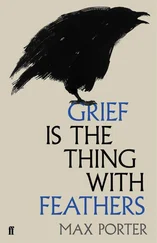Alanis Bell found him as he was passing over the high hill.
“Gob Woodhull,” she said. “Where are you going?”
“Get away from me,” Gob said. She danced around him, skipping and throwing her hands out. Her prancing seemed an offense against his sadness.
“It is a beautiful night,” she said. “Where are you going in such a hurry?”
“To see the Urfeist,” he said. That put an end to her prancing. She grabbed his arm.
“Hush! You know better than to say that name. You’ll call him down on us!” He pulled his arm away.
“Leave me alone,” he said, but she kept clutching at him.
“He’ll bite your finger! He’ll eat you up! He’ll break your bones!”
“I’ll break yours!” he said, pushing her away from him. “I’ll lift you up and break you in half, you girl!” He had pushed her down and now he was standing over her, ready to step on her or kick her. “Go away,” he said quietly. He turned away and walked on.
“Go on!” Alanis Bell called out behind him. “I don’t care!” But the warbling noise came drifting after him as he walked. He stopped up his ears with his fingers.
Gob did not know where he was going. He simply wandered. It was common knowledge that the Urfeist could smell a child from miles away. Gob closed his eyes and pretended to be asleep, because it was also said that the Urfeist drew sleeping children to him with a call that only they could hear and follow. More than one child slept with a leash that ran from ankle to bedpost, to prevent just that sort of wandering. Gob got quite lost.
The wind had picked up, and a bit of slivered moon was in the sky. It peeped out occasionally from between racing blue clouds, and lit the spinning fall of oak leaves when the wind nudged them off the trees. Gob happened upon a hawthorn bush. Resting next to it, he saw that a shrike had left a tiny shrew impaled on a long thorn. If that is not an omen, he thought, then my name is Mary Lincoln and I own many fine gowns. It was just then, when cowardice very nearly overwhelmed him, that he caught sight of a cheery yellow light beckoning through the bush.
He picked his way through with care. He hid his hands in his coat and hunched his face down against his chest, but still he got a scratch high on his forehead. He wondered if the odor of blood would draw the Urfeist from his cave. Gob stood watching the entrance for a long time. There was a space cleared before it, where roses were planted in orderly rows, and when he moved a little closer he saw that taller rosebushes flanked the cave mouth, which opened into what must surely be the highest hill in the woods. The entrance turned as soon as it opened. All he saw was yellow light flickering on gray rock.
“I’m here,” Gob said, speaking so low he could hardly hear himself above the wind.
“I know it,” said a voice beside him. The Urfeist looked just how people made him out to look. There was the scraggly iron-colored hair, the jaunty red cap. He wore a chemise of some animal’s skin, and the kilt of fingers was pulled up high on his hairy belly. His feet were wound with bark. “You are welcome here, child,” he said. “I’ve been waiting for you.” He was always waiting for a child to come to him. The Urfeist smiled, showing strong white teeth that would have been the envy of a horse.
“I want something,” said Gob. “I’ll pay for it. I want my brother back. He’s dead but I want to bring him here again, into the world. It’s got to be so he’s a living boy.” He kept babbling because the Urfeist said nothing. He only moved one long finger slowly towards Gob’s face. Gob did not try to back away, but he did not think he could have, had he tried. The Urfeist put his finger gently against Gob’s lips.
“Hush,” he said. He left his finger there for a long moment. Gob was dashed with horror, as if someone had filled a bucket with pure liquid horror and dumped it over his head. Now he found he could move, so he turned and ran, faster than he thought he’d be able to, with his bad leg. He burst through the hawthorn, hardly aware of the scratches he got, and went running through the woods towards home. He felt borne up by fear, lifted and pushed by a great, blowing terror. His mama chased him, sometimes, when she was drunk on her visions of personal glory. She always wanted Gob then, not Tomo. It was Gob she wanted to catch up in a crushing embrace, and it was into his ear she wanted to pour her rushing sibyl’s monologue — she’d go on and on about all the fantastic things that lay in store for her and her sons, how she would be the leader of her people and deliver all the world from misery, how a golden age would be born in her and through her. Gob came to fear these attacks of hers. He’d run from her when she had the particular look in her eyes, when he knew what was coming. Tomo would exhort him, saying, “Run, Gob, run!” He’d flee through the orchard with his mama close behind, her arms held out in front of her and her hands grasping for him like the jaws of some small, famished animal. She always caught him, always spoke her glory into his ear, telling him how her sons were part of her, how they were connected by mystic cords, so no matter how far away he or Tomo went they would all three still be one.
Gob never looked back, but he thought he could feel the Urfeist pursuing him, drawing closer and closer. He was certain, then, that the monster would kill him. He was certain that it would tear off his head and kick it all the way back to Homer, or that it would sip blood from his wrists until he swooned away into death. He knew that he should stop running and face it, anyhow, that he must do this for Tomo’s sake, and yet he did not. He ran all the harder, but he couldn’t run fast enough to escape it. Gob knew when the Urfeist was just behind him, and closed his eyes just before the thing knocked into his back and sent him sprawling among dry leaves.
“Hush,” the Urfeist said again. He undressed trembling Gob with great tenderness, which was horrible because it was not expected, and though he looked thin and weak as Anna, his grip on Gob’s neck was strong, and the weight of him on Gob’s back felt heavy as the world. He worked to a chanted, unintelligible cadence. When he was finished, he lifted Gob up, took his limp hand into his own and put Gob’s left littlest finger in his mouth. He bit it clean through. Gob could not watch it happen, but he imagined the Urfeist’s mouth opening wide and moonlight racing between the clouds to strike his white teeth. Gob thought then how the bite was a mercy because it distracted you from the other thing, and he made a noise, though he’d sworn to himself he would make none. It was a pitiful sound, a single plaintive, dwindling O like a girl might make if you stole away her dolly. He heard the sound as if somebody else was making it, and then he fell back on the ground, what remained of his finger pulling from the Urfeist’s sucking mouth with a wet pop.
When he woke, Gob was inside the Urfeist’s cave, a distinguished dwelling. There were rugs laid three deep on the stone floor, and the furniture was elegant and expensive-looking. Dressed again, Gob was draped over a blue damask divan. Another cave opened up onto the one he lay in, and another opened up beyond that. Gob’s hand was bandaged neatly; there was just a little spot of pale pink fluid at the place his finger had been. The Urfeist was smoking in a matching blue chair directly across from him.
“I know who you are,” he said. “Did your grandmama send you to me?”
“No,” Gob said, and then he asked again, “Will you teach me?” It occurred to him how he had extracted no promises from this creature before he submitted to him.
“What would you like to know?” said the thing. He still wore his bark shoes and red hat, his skin shirt and the horrific finger-kilt, over which Gob’s eyes darted in search of his own lost digit. But the Urfeist seemed the very picture of urbanity, and spoke with an air of refinement that reminded Gob of the way his mama talked when she was trying to make people think she wasn’t a Claflin.
Читать дальше












